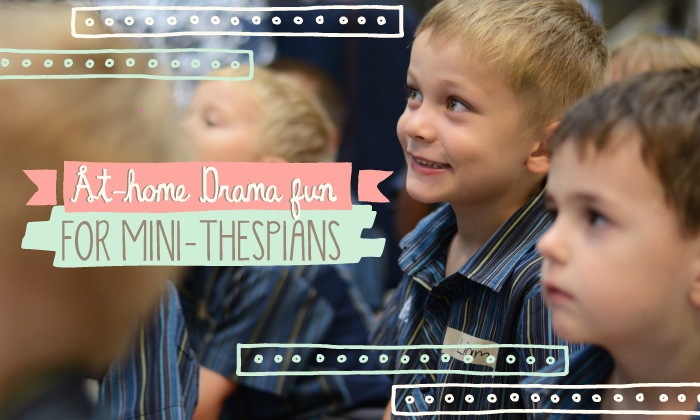
Fantastic strategies to help your shy toddler come out of their shell through speech and drama games
Is your little one shy or hesitant to participate in group activities, mama? We all want to raise self-assured children who can confidently get involved and excel in the classroom. A great way to build your child’s communication skills is through conversational ability, and starting in January 2016 the Australian International School (AIS) will introduce a specialist Speech and Drama Programme based on the curriculum and examinations of the London Academy of Music and Dramatic Art (LAMDA).
LAMDA has over 150 years’ experience fuelling the performing arts across the globe, and famous alumni too numerous to list out here, mama! The Speech and Drama Programme will begin at the AIS Early Years Centre (EYC) at age 3 and through dramatic play, children will learn to be confident public speakers with an enhanced understanding of language. Ashleigh Huxtable, Head of Drama at AIS, recommends these fun and easy speech and drama activities to help your littlie become a confident speaker; see below for more deets, mama!
- Bean Bag Voice Projection:
Place three bean bags, or three of your child’s favorite stuffed toys, in front of your child at different distances (e.g. one about half a meter away, another 1 meter away and the third one placed across the end of the room). Ask your child to look directly at each bean bag or toy, one at a time, saying their own name and the name of their favorite animal. This game will teach them to project their voices louder as they speak to the bean bags that are farther away, and softer when speaking to a bean bag that is close to them.
Click here for a list of prompts your child can discuss with their stuffed animals!
- Quack, Oink and Moo:
Substitute a commonly used word, such as “I” or “want” with an animal sound, such as “quack”, “oink” or “moo”. Ask your child to tell a story, replacing the chosen word with the correct animal sound (e.g. “Quack took the bus to school this morning!”). This helps children practice thinking carefully while speaking so as to avoid jumbling words or stuttering. It should also get some laughs!
Click here for a list of silly substitution words.
- Ribbon of Sound:
A variation of the game “Telephone”, this activity requires the family or group of friends to sit in a circle. Ask your child to start a sound and pass it on to the person on the left, who then passes it on to the next person and so on. When the sound gets back to your child, he or she has to transform this into a new sound and pass it on. This teaches your child to listen carefully as well as to enunciate clearly so that the sound is not distorted.
- Walk the Runway:
Help your child overcome stage fright by setting up a catwalk in your home using a long rug or a row of couch cushions. Prepare different props or outfits. Ask your child to dress up in a chosen outfit (e.g. dress up as mom) and then strut the runway in character. To end the fashion show with a bang, ask your child to wear their own clothes and walk down the catwalk confidently as themselves.
Click here for some runway-ready costume recommendations.
![]()
Beyond these home activities, it’s important for your child to feel comfortable interacting with peers and adults, even if they’re not attending school yet. AIS’s inquiry-based curriculum, guided by the International Baccalaureate Primary Years Programme framework, builds confidence and self-respect in children by putting them at the centre of the learning journey. On 10 September, 2 – 5 year olds at AIS will demonstrate their communication skills by sharing their learning journey with parents and teachers at the annual Exhibition of Learning; experience this exciting event by registering for the Open House, mama!
Need some guidance on how to implement these strategies successfully? AIS hosts regular free playgroups guided by Early Years curriculum specialists, which offer social time and interactive learning for children from 1-4 years old. Enquire now or book a personal tour to find out more!
Australian International School Pte Ltd is registered by the Council for Private Education. CPE Registration Number 199204405H. Period of Registration 6 July 2015 to 5 July 2019.
Australian International School, 1 Lorong Chuan Singapore 556818, Tel: (+65) 6883 5155, www.ais.com.sg
Brought to you in partnership with Australian International School






 View All
View All




 View All
View All









 View All
View All



